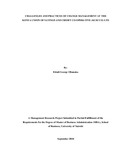| dc.description.abstract | They say that change is inevitable. Change forms the foundation of all progress in life. Change occurs in different ways and entities have to embrace it to survive. Organizations are operating in a highly competitive environment that is global in nature. Companies are no longer competing on a national level but on a global scale with competitors from all comers of the world. As a result, they have had to change the way they conduct business to survive. Information technology has taken over our lives. Computer systems run most functions. Entities, individuals and nations have thus been forced to change and adapt to the new system of operation.
Political changes are the order of the day with new political orders being introduced in various countries around the world. The new political leaders bring with them new policies to change things. Change is thus a part of everyday life. Entities either change to survive or remain steeped in their old ways and perish as change sweeps away the unprepared and intransigent. This project looked at the challenges facing the change management process at KUSSCO. The Kenya Union of Savings and Credit Cooperatives was set up in 1973 as an umbrella organization for all Savings and Credit Cooperative Societies in Kenya. The organization is currently in the process of implementing a strategic plan for the year 2009-2013.
This study sought to identify the forces that brought about the change, the change management practices adapted by the organization, the causes of resistance to change and finally the challenges. This was a case study where data was collected using semi-structured interviews with an interview guide and questionnaires. The respondents comprised of nine senior managers at KUSCCO Ltd. Thereafter content analysis was used to analyze the data.
Findings of research indicated that the main forces of change at KUSCCO Ltd. Were changes in technology, competitive, pressure, globalization and political forces and the main change management practices adopted at KUSCCO Ltd were communication with staff. The least preferred practiced was the formation of teams. Resistance to change at KUSCCO was mainly driven by fear of loss of power and fear of loss of power ad fear of loss of salary. Challenges faces were: the lack of funds; lack of proper technology and lack of sufficient skills. | en_US |

